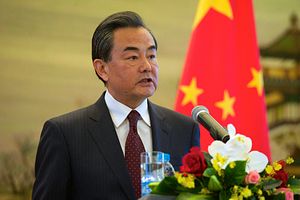On March 8, from the sidelines of the annual session of China’s National People’s Congress (NPC), Chinese Foreign Minister Wang Yi hosted a press conference on China’s foreign policy. Remarkably, questions either directly targeting or indirectly involving U.S.- China relations nearly dominated the whole press conference.
As The Diplomat has been closely following, in recent weeks, U.S. President Donald Trump has repeatedly publicly blamed China for the U.S. trade deficit and job losses in its manufacturing sector. On March 7, Trump once again pressed China on Twitter to “develop a plan for the year of a One Billion Dollar reduction in their massive Trade Deficit with the United States.” Besides economic issues, the United States has also singled Beijing out on the security front, claiming that China — as a “strategic competitor” — has threatened U.S. interests.
In an attempt to forestall a potential trade war and dispel U.S. concerns, in February Chinese President Xi Jinping sent two special envoys — China’s top diplomat, Yang Jiechi, and Xi’s top economic adviser, Liu He — in succession to Washington, DC for talks with U.S. senior officials. Yet it appeared that neither envoy achieved anything close to a breakthrough.
In the March 8 press conference, Wang Yi took a soft tone and tried again to send Washington the message that China doesn’t want to displace the United States or have a trade war.
Wang first quoted a recent U.S. public opinion poll conducted by Gallup, saying that the percentage of Americans with a favorable view of China has jumped above 50 percent for the first time in almost three decades. Wang thus urged all reporters to pay more attention to those positive elements rather than the problems between China and the United States.
Speaking specifically about trade relations, Wang said that history has proved that a trade war is never the right way to solve a problem. He called on the United States to be responsible to its own people as well as people worldwide and sit down together with China to have “a calm and constructive dialogue for a win-win solution.”
Although Wang did say that China will “make a necessary response in event of a trade war with the United States” — as many foreign media outlets have highlighted — his tone and wording this time were significantly more moderate than previous comments from the Chinese Foreign Ministry and Ministry of Commerce.
In response to the U.S. security concerns against China, Wang claimed that competition between the world’s largest developing country and the largest developed country is normal.
“In other words, China and the United States can be competitors, or even partners, but not rivals,” Wang said. “China is on a long march to modernization; it has no need or intention to replace the United States’ international role.”
“Some Americans allege that China will displace the United States’ role in the world. This conclusion is fundamentally wrong,” Wang emphasized.
In fact, for years, China’s senior officials have repeatedly tried to dismiss the “China threat theory.” Based on recent moves (including sending special envoys to Washington and hosting Trump with the “state visit-plus” treatment in Beijing), it is fair to say that China’s strong intention to avoid conflict with the sole superpower in the world is not fake.
However, Chinese officials have never been able to fully justify the motivation behind China’s rapid global expansion.
In the same press conference, Wang boasted about the Belt and Road Initiative and China’s increasing presence in Latin America, Africa, Central Asia, and other corners of the world.
Notably, Wang attributed China’s “historic achievements” to “Chairman Xi” personally.
“Chairman Xi Jinping, as the chief architect of China’s major-country diplomacy, has been personally involved in planning and conducting ‘brilliant’ head-of-state diplomacy,” Wang said. “[Xi’s diplomacy] not only deepened the world’s understanding of China, but enhanced China’s profile and influence and facilitated the solution to many global problems.”
Wang’s remarks about Xi stirred up memories of the Mao era — when China actively spread its ideology to other countries despite its own citizens’ adversity at home.

































